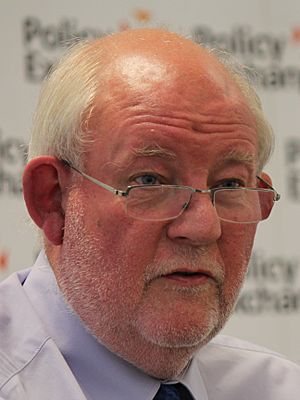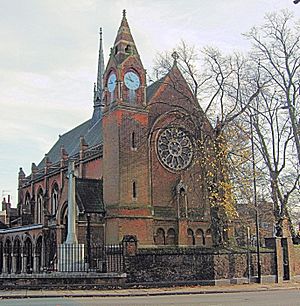Charles Clarke facts for kids
Charles Rodway Clarke (born 21 September 1950) is a British politician from the Labour Party. He held important jobs in the government under Prime Minister Tony Blair from 2001 to 2006. His last big role was as Home Secretary from December 2004 to May 2006. Mr. Clarke was also a Member of Parliament (MP) for Norwich South from 1997 to 2010.
Quick facts for kids
Charles Clarke
|
|
|---|---|

Clarke in 2014
|
|
| Home Secretary | |
| In office 15 December 2004 – 5 May 2006 |
|
| Prime Minister | Tony Blair |
| Preceded by | David Blunkett |
| Succeeded by | John Reid |
| Secretary of State for Education and Skills | |
| In office 24 October 2002 – 15 December 2004 |
|
| Prime Minister | Tony Blair |
| Preceded by | Estelle Morris |
| Succeeded by | Ruth Kelly |
| Minister without Portfolio Chairman of the Labour Party |
|
| In office 9 June 2001 – 24 October 2002 |
|
| Prime Minister | Tony Blair |
| Preceded by | Peter Mandelson |
| Succeeded by | John Reid |
| Minister of State for Home Affairs | |
| In office 29 July 1999 – 9 June 2001 |
|
| Prime Minister | Tony Blair |
| Preceded by | Baron Williams |
| Succeeded by | Keith Bradley |
| Parliamentary Under-Secretary of State for Lifelong Learning | |
| In office 28 July 1998 – 29 July 1999 |
|
| Prime Minister | Tony Blair |
| Preceded by | Kim Howells |
| Succeeded by | Malcolm Wicks |
| Member of Parliament for Norwich South |
|
| In office 1 May 1997 – 12 April 2010 |
|
| Preceded by | John Garrett |
| Succeeded by | Simon Wright |
| Personal details | |
| Born |
Charles Rodway Clarke
21 September 1950 Hammersmith, London, England |
| Political party | Labour |
| Spouse | Carol Pearson |
| Alma mater | King's College, Cambridge |
| Signature |  |
Contents
Early Life and Education
Charles Rodway Clarke was born in London on 21 September 1950. His father, Sir Richard Clarke, worked in a very senior role in the Civil Service, which helps run the country.
Charles went to Highgate School, a private school, where he was the Head Boy. After that, he studied Mathematics and Economics at King's College, Cambridge University. While at Cambridge, he was also the president of the Cambridge Students' Union, a group that represents students.
From 1975 to 1977, Mr. Clarke was the president of the National Union of Students, which represents students across the UK. He joined the Labour Party around this time.
Early Political Work
Mr. Clarke was elected as a local councillor in the London Borough of Hackney. This meant he helped make decisions for the local area. He led the Housing Committee and was vice-chair of economic development from 1980 to 1986.
He then worked for Neil Kinnock, who was the leader of the Labour Party. Mr. Clarke was Mr. Kinnock's chief of staff from 1985 until 1992. After the 1992 general election, he worked in the private sector, leading a company that advised on public affairs. He later became a rising star in the Labour Party under Tony Blair's leadership.
Member of Parliament and Cabinet Roles
Mr. Clarke was elected to the UK Parliament in 1997. This was a big election where the Labour Party won many seats. He spent about a year as a regular Member of Parliament (MP) before joining the government in July 1998 as a junior education minister.
In 1999, he moved to the Home Office, a government department dealing with law and order. After the 2001 general election, he joined the Cabinet, which is a group of the most important government ministers. He became a Minister without Portfolio and the Chair of the Labour Party.
Education Secretary
On 24 October 2002, Mr. Clarke became the Secretary of State for Education. This meant he was in charge of education across the country. As Education Secretary, he supported universities like Oxford and Cambridge (often called Oxbridge). He also encouraged the creation of specialist secondary schools, which focus on certain subjects.
He also helped introduce new laws that allowed universities in some parts of Britain to charge "top-up fees." These were extra fees for students, even though the Labour Party had promised not to introduce them.
Home Secretary
On 15 December 2004, Mr. Clarke was appointed Home Secretary. This is one of the most important jobs in the government, responsible for national security, policing, and immigration.
He worked on new ideas to fight terrorism. Some people worried that his plans might change old British laws about fair trials. He also supported identity cards, saying they were needed to fight terrorism, but some people thought they invaded privacy.
During 2005, when Britain was leading the European Union, Mr. Clarke pushed for a rule that would make phone companies store communication data for law enforcement. This rule was also criticized for affecting people's privacy.
In 2006, he ended a system that gave money to people who were wrongly found guilty of a crime. This decision was seen as very unfair by some legal experts.
Foreign Prisoners Issue
On 25 April 2006, it was discovered that over 1,000 foreign prisoners had been released without being considered for deportation. This meant they might have been sent back to their home countries but were not. Among those released, some had committed serious offenses.
This issue caused a lot of concern. Many people called for Mr. Clarke to resign from his job. He offered to resign, but Prime Minister Tony Blair did not accept it at first. However, after the Labour Party did not do well in local elections in May 2006, Mr. Clarke was removed from his role in a government reshuffle. He was replaced by John Reid.
Life After Government
After leaving the Cabinet, Mr. Clarke became a backbencher, meaning he was still an MP but no longer a minister. He gave interviews where he criticized the new Home Secretary and said that Tony Blair should have supported him more.
In September 2006, he started working as a consultant for a law firm, which made people think he might not return to a top political job.
Labour Leadership Discussions
Mr. Clarke also spoke out about who should lead the Labour Party after Tony Blair. He criticized Gordon Brown, who was expected to become the next leader, saying he was "a control freak" and "deluded." He suggested other politicians who he thought could be prime minister.
He also helped set up a website called "The 2020 Vision" to discuss the future of the Labour Party. Some people saw this as a way for those who didn't support Gordon Brown to work together.
In 2008 and 2009, Mr. Clarke continued to criticize Gordon Brown's leadership. He even said he was "ashamed" to be a Labour MP at one point. He believed that Mr. Brown should step down to help the Labour Party do better in the next election.
After Parliament
Mr. Clarke lost his seat in Parliament in the 2010 General Election by a very small number of votes. He said he was unlikely to run for Parliament again.
Since then, he has worked as a Visiting Professor at the University of East Anglia and Lancaster University, teaching about politics. He is also a member of the European Council on Foreign Relations and the European Leadership Network, which are groups that discuss international issues.
The 'Too Difficult' Box
Mr. Clarke introduced an idea called the "too difficult box." This explains why politicians sometimes avoid fixing big problems. He wrote a book about it in 2014 called The 'Too Difficult' Box: The Big Issues Politicians Can't Crack.
In the book, he explains that politicians might find issues "too difficult" to deal with for several reasons:
- It's hard to understand the problem fully.
- It's hard to find a good solution.
- It's hard to put a solution into action.
- Powerful groups might not want changes.
- Existing laws might make it hard to act.
- Making new laws takes a very long time.
- Politicians might not have enough energy or desire to tackle the problem.
Personal Life
Charles Clarke married Carol Pearson in 1984. They have two sons, Christopher (born 1987) and Matthew (born 1990). They live in Cambridge. Mr. Clarke can speak Cuban Spanish, French, and German.
In 2004, he became a fellow of the Royal Statistical Society, which is a group for people interested in statistics. This was to honor his father, who was a statistician. Mr. Clarke is also a big fan of Norwich City Football Club.
In July 2018, he received an honorary degree from the University of East Anglia.
 | Chris Smalls |
 | Fred Hampton |
 | Ralph Abernathy |


